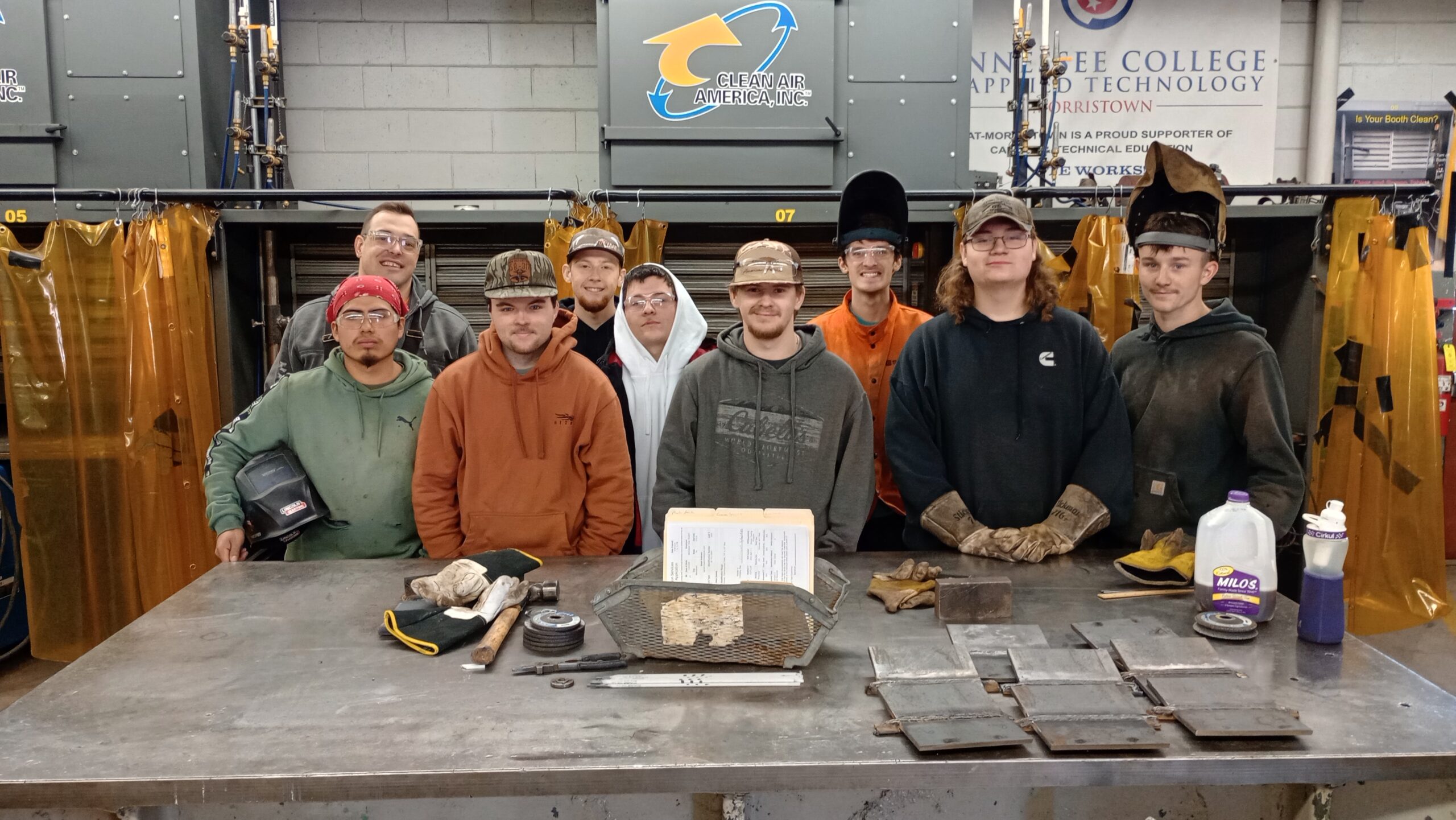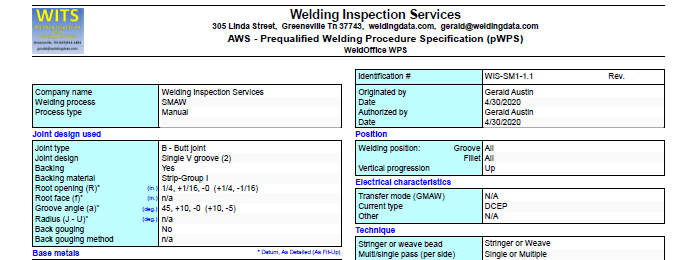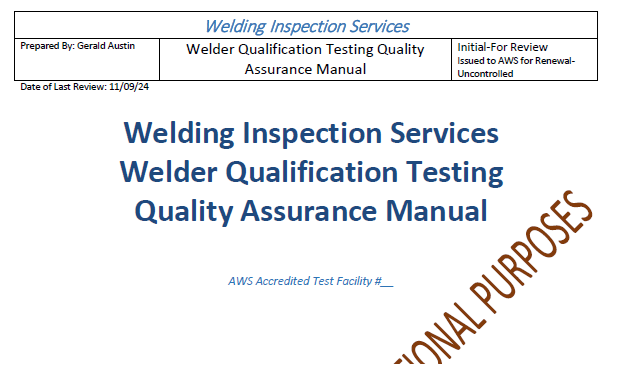Why is an industry recognized credential important?
Well this one probably has many opinions. In the world of welding that I’m from, I’ve never provided an existing “certification” to a potential employer and they hire me based upon that piece of paper. Welding teachers and school administrators may have varying opinions on many things. I have however got my “foot in the door”. The AWS Certified Welder program may or may not be “recognized” by your local or regional industry. Industry representatives in your area may even have a negative opinion of the credential. Regardless, if its listed in your Perkins Plan, Its important to somebody!
The term “Industry recognized credential” in this context is more related to whatever your state/regional department of education has decided to label as such. The purpose of this is to qualify for funding through the Perkins act. I’m NOT an expert in Perkins requirements however, having some experience as a High School Welding teacher for a few years, I’m familiar with strong need to comply with the requirements contained. The need comes down to $$$$. But another need is allowing students to try out their skills and knowledge to a recognized standard and gain the feeling of accomplishment in their area of study. The level of “accomplishment” may vary…more on that in a minute.
Check your state plan.
Each individual state has specific requirements for what “credentials” are satisfactory. AWS certified Welder may not even be listed. Other programs such as AWS SENSE , NCCER Welding and LEEPS/NC3 may also be listed. If they are, and your participating, and happy with the process, the AWS Certified Welder program may not be of interest. If you are participating in any of those to meet your Perkins requirements, feel free to share your thoughts. Here is a link to the one from Tennessee at the time of this writing.
If you’ve been getting your welders tested by a lab, a postsecondary institution, or an individual CWI, that doesn’t mean it wasn’t valuable to your student. Just be aware that it may not meet the requirements of your state….or it may. You can be pretty confident that most CTE directors and other educational administrators may not fully understand what’s required.
Some state plans that reference AWS Certified Welder may specify a specific test such as an AWS D1.1 3G/4G Limited Thickness test or may leave it completely open. Some could be considered “AWS certified Welders” by making 2 horizontal lap joint fillet welds on some 10Ga per AWS D1.3 and get the same “Title”. (NOTE: I do not support D1.3 testing on fillet welds for student industry credentials).
How to get the “credential”!
If your state plan specifically indicates AWS Certified Welder, it is assumed that is a welder that has been certified at an AWS Accredited Test facility however welding terminology is misunderstood by educators, administrators, industry, and welders. If you have doubts about what the actual requirement is, check with your state CTE folks.
If the actual AWS Certified Welder credential is required and not a “Welder tested in accordance with an AWS Code, then the testing must be performed under the rules of an AWS Accredited Test Facility. If you are not sure where one is located, then you can check the AWS Website. The list is a .pdf file and has ATF listings by state. I am located in Tennessee.
How is AWS Certified Welder Testing at an ATF Different.
- The tests can be from almost any code or standard and any of the AWS supplements that are mentioned in AWS QC7.
- If testing at an AWS ATF, the rules that apply to a specific code still apply. Additional requirements may be in place for the test but the major differences lie in what the facility must do. Those requirements are currently addressed in AWS QC4 and are handled in a manner outlined in that organizations quality manual and/or associate organization procedures. Some of the additional requirements are
- A written and auditable quality system is required that is in accordance with AWS QC4.
- Materials are controlled in accordance with an organization policy and/or procedure. Industry codes or standards may not require material traceability as is required by an AWS ATF.
- Procedures/checklists for the testing are required for the testing process. For most codes, only a WPQR is required.
- Auditing of the facility is required. The audit covers both the written practices and a demonstration of the facilities ability to complete the testing they intend to perform. Auditing also has a fee.
- Unique identification of test assemblies is required and the method referenced in policies/procedures.
- Review of requirements with the welder is required and must be documented.
- Equipment must be verified to be able to operate within specified parameters.. This can be by calibration of the welding equipment or verification of setting with calibrated equipment.
- Policies for calibration must be in place for measuring instruments.
- Welder Performance Qualification records and WPS’s used during the test must be submitted to AWS.
- ONLY an AWS CWI may administer and supervise a test. This is the ONLY case in which I am aware of in which a CWI is the only person allowed to administer the test. Industry codes such as ASME IX, AWS D1.X, and API 1104 have no such restriction. In the future, it is expected that not only must you be an AWS CWI, but you must also have the AWS WPQ1 Endorsement.
- Upon completion of a test, a fee must be paid to AWS for registration in the AWS Certified Welder Registry. The ONLY tests that can entered in that registry are those performed by an AWS ATF and their authorized test supervisor(s).
- After a welder has passed, they are issued an AWS Certified Welder Number and are visible at https://cloudweb2.aws.org/Certifications/CWSearch/ (if they chose that option at registration)
- The AWS Certified Welder Card is issued and may or may not contain adequate information related to what is required to be documented by industry codes or standards.
- AWS Certified Welders may or may not be “recognized by industry” so applicants must be made aware of that. In most cases, they are referred to AWS QC7 and applicable supplements.
How I can help.
My system allows for me to come to your facility and test welding students, as long as they aren’t one of my past students. AWS QC47 is supposed to be implemented in the future and will modify that restriction. I will typically provide a significant discount for testing high school students. I can do this as an hourly charge or discounted flat fee.
My system allows for other CWI’s that meet the requirements of my system to test welders at any location provided all of my system requirements are met. (Material Control, Procedures followed, Equipment Verified etc..). If other CWI’s that have met the requirements perform testing, you will be responsible to them for whatever fees they charge. They will pay me a flat fee for performing testing under my facility. Do note that photographic recording of the testing may be required.
If you would like to know more, talk about what you need as an teacher, or if your an AWS CWI with welder testing experience and would like to test welders under my program, we can talk.
If I can help you with anything related to this post, please post in the comments or call/text 423-914-1481.
If you would like to see a sample of my manual. Here you go.


